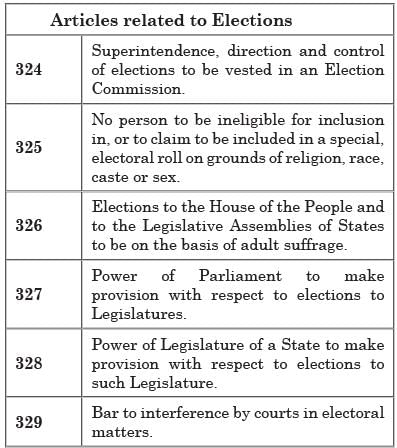Test: Polity NCERT Based Test - 1 - UPSC MCQ
25 Questions MCQ Test - Test: Polity NCERT Based Test - 1
The Constitution limits the power of the Government by means of:
1. Right to Freedom of Speech and Expression.
2. Right to Constitutional Remedies.
Which of the above statements is/are correct?
1. Right to Freedom of Speech and Expression.
2. Right to Constitutional Remedies.
The idea of “Welfare State” in the Indian Constitution is enshrined in its
A citizen acquiring citizenship through naturalization
A candidate desires to get elected to the municipal council of his city. The validity of his nomination would depend upon the important condition, among others, that;
Consider the following statements regarding the Parliamentary Committees:
1. Standing Committees supervise the work of various departments, their budget, expenditure and bills that come up in the house relating to the department.
2. Joint Parliamentary Committees (JPCs) can be set up for the purpose of investigating financial irregularities.
3. Members of JPCs are selected from both the houses of the Parliament.
Which of the above statements are correct?
Regarding Constitutional Amendments
1. The provision of Joint sitting is not available
2. They become operatives from the date both Houses have passed the bills
3. The President’s assent to a constitutional amendment is obligatory.
4. Parliament may amend any part of the Constitution according to the procedure laid down in Art 368.
Choose the correct answers from the code below
With reference to Article 20 of the Constitution of India, consider the following statements:
1. Both civil and criminal laws cannot be applied retrospectively.
2. The protection against self-incrimination extends to both criminal and civil proceedings.
Which of the statements given above is/are correct?
With reference to powers of the President of India, consider the following statements:
1. He has the power to summon both the Houses of the Parliament.
2. He has veto power by which he can withhold assent to Bills passed by the Parliament.
Which of the above statements is/are correct?
Which one of the Parliamentary committees in India is a ‘watchdog’ on departmental expenditure and irregularities?
Consider the following statements regarding reorganization of the states:
1. An Indian territory can be ceded to a foreign country by an executive action.
2. A boundary dispute settlement between India and another country does not require constitutional amendment.
Which of the statements given above is/are correct?
Consider the following:
“An order is served to four newsreaders of a television channel that they would no longer read the news on screen. They are all women. The reason given is that they are above the age of forty-five. Two male newsreaders above the same age are not barred from presenting the news”.
Which of the following Fundamental Rights is violated in the above given situation?
Which of the following is NOT applicable regarding the purpose of CUT Motion?
The Preamble enshrines certain ideals that were first spelt out in
Which of the following is/are correct regarding Governor’s discretionary powers?
1) He/She can use it to dissolve legislative assembly.
2) He/She can use it to dismiss the Chief Minister.
3) He/She can use it to appoint Cabinet Secretary of a state.
Choose from the given code.
Consider the following statements regarding the basic structure of the Indian Constitution:
1. In Kesavananda Bharati case, the Supreme Court gave the concept of the basic structure of the Constitution.
2. Parliament can violate the basic structure through constitutional amendment.
Which of the above statements is/are correct?
Some of the Fundamental Rights are not available to the members of the Armed Forces. Who reserves the right to decide the same?
No bill seeking to impose restrictions on inter-state trade can be introduced in a State Legislature:
Which of the following has been adopted from Westminster system of government in Indian Constitution?
1) Parliamentary form of Government
2) Fundamental Rights
3) Federal Structure
4) Judicial Independence
Select the correct answer using the code given below:
Consider the following statements regarding the removal process of the Election Commissioners:
1. The Chief Election Commissioner can be removed from his office in the same manner and on the same grounds as a judge of the Supreme Court.
2. Any other Election Commissioner or a Regional Commissioner cannot be removed from the office except on the recommendation of the Chief Election Commissioner.
Which of the above statements is/are correct?
Consider the following statements regarding the instruments used by the Parliament to control the Executive:
1. In the Zero Hour, ministers are bound to reply the questions asked by members.
2. Half-an–hour discussions are done on the matters of public importance.
3. Preparation and presentation of budget for the approval of the legislature is constitutional obligation of the government.
Which of the above statements is/are correct?
Which of the following provisions under Article 21 of the Indian Constitution is incorrect?
Consider the following statements regarding the Universal Adult Franchise as given in the Constitution of India:
1. It means that the Right to Vote should be given to all adult citizens without discrimination of caste, class, color, religion or sex.
2. It is inconsistent with the principle of equality.
Which of the above statements is/are correct?
Consider the following statements regarding the Anti-Defection Law in India:
1. 52nd Amendment was related to the antidefection law.
2. 91st Amendment was related to the antidefection law.
Which of the above statements is/are correct?





















